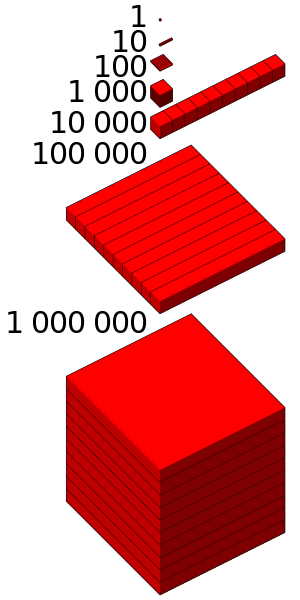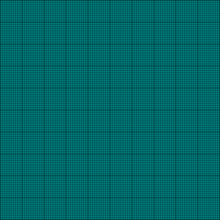- Million
-
List of numbers – Integers
Cardinal One million Abbreviation M Ordinal One millionth Roman numeral M Factorization 26 · 56 Binary 11110100001001000000 Hexadecimal F4240 One million (1,000,000) or one thousand thousand, is the natural number following 999,999 and preceding 1,000,001. The word is derived from the early Italian millione (milione in modern Italian), from mille, "thousand", plus the augmentative suffix -one.[1]
In scientific notation, it is written as 1×106 or just 106.[2] Physical quantities can also be expressed using the SI prefix mega, when dealing with SI units. For example, 1 megawatt equals 1,000,000 watts.
The meaning of the word "million" is common to the short scale and long scale numbering systems, unlike the larger numbers, which have different names in the two systems.
The million is sometimes used in the English language as a metaphor for a very large number, as in "Never in a million years" and "You're one in a million", or a hyperbole, as in "I've walked a million miles" and "You've asked the million dollar question".
Contents
Visualizing one million
Even though it is often stressed that counting to precisely a million would be an exceedingly tedious task due to the time and concentration required, there are many ways to bring the number "down to size" in approximate quantities, ignoring irregularities or packing effects.
- Information: Not counting spaces, the text printed on 136 pages of an Encyclopædia Britannica, or 600 pages of pulp paperback fiction contains approximately one million characters.
- Length: There are one million millimeters in a kilometer, and roughly a million sixteenths of an inch in a mile. A typical car tire might rotate a million times in a 1,200-mile (1,900 km) trip, while the engine would do several times that number of revolutions.
- Fingers: If the width of a human finger is 2.2225 cm (7/8 inch), then a million fingers lined up would cover a distance of approximately 22 km (14 mi). If a person walks at a speed of 4 km/h, it would take them approximately five and a half hours to reach the end of the fingers.
- Area: A square a thousand objects or units on a side contains a million such objects or square units, so a million holes might be found in less than three square yards of window screen, or similarly, in about one half square foot (400–500 cm2) of bed sheet cloth. A city lot 70 by 100 feet is about a million square inches.
- Volume: The cube root of one million is only one hundred, so a million objects or cubic units is contained in a cube only a hundred objects or linear units on a side. A million grains of table salt or granulated sugar occupies only about 64 ml, slightly over a quarter of a cup, the volume of a cube one hundred grains on a side. One million cubic inches would be the volume of a small room only 8 1/3 feet long by 8 1/3 feet wide by 8 1/3 feet high.
- Mass: A million cubic millimeters (small droplets) of water would have a volume of (one litre) and a mass of one kilogram. A million millilitres or cubic centimetres (one cubic metre) of water has a mass of a million grams or one tonne.
- Weight: A million 80 milligram Honey bees would weigh the same as an 80 kg person.
- Landscape: A pyramidal shaped hill 600 feet (180 m) wide at the base and 100 feet (30 m) high would weigh about a million tons.
- Computer: A display resolution of 1,280 by 800 pixels contains 1,024,000 pixels.
- Money: A USD bill of any denomination weighs 1 gram. There are 454 grams in a pound. One million $1 bills would weigh in at 2,204.62 pounds, or just over 1 ton.
In Indian English, it may be known as 10 lakhs.
See also
- Orders of magnitude (numbers) to help compare dimensionless numbers between 1,000,000 and 10,000,000 (106 and 107).
- Names of large numbers
Selected 7-digit numbers (1,000,000 – 9,999,999)
- 1,000,003 – Smallest 7-digit prime number
- 1,046,527 – Carol number
- 1,048,576 = 220 (power of two), 2,116-gonal number, an 8,740-gonal number and a 174,764-gonal number, the number of bytes in a mebibyte, the number of kibibytes in a gibibyte, and so on. Also the most rows that Calc [3] (OpenOffice.org Calc 3.3) can accept in a single worksheet.
- 1,048,976 – Leyland number
- 1,050,623 – Kynea number
- 1,058,576 – Leyland number
- 1,084,051 – Keith number
- 1,089,270 – harmonic divisor number
- 1,136,689 – Pell number, Markov number
- 1,234,567 – Smarandache consecutive number (base 10 digits are in numerical order)
- 1,278,818 – Markov number
- 1,346,269 – Fibonacci number, Markov number
- 1,413,721 – square triangular number
- 1,421,280 – harmonic divisor number
- 1,441,440 – colossally abundant number
- 1,441,889 – Markov number
- 1,539,720 – harmonic divisor number
- 1,563,372 – Wedderburn-Etherington number
- 1,594,323 = 313
- 1,596,520 – Leyland number
- 1,647,086 – Leyland number
- 1,679,616 = 68
- 1,686,049 – Markov number
- 1,741,725 – equal to the sum of the seventh power of its digits
- 1,771,561 = 116 = 1213 = 13312, also, Commander Spock's estimate for the tribble population in the Star Trek episode "The Trouble With Tribbles"
- 1,941,760 – Leyland number
- 1,953,125 = 59
- 2,012,174 – Leyland number
- 2,012,674 - Markov number
- 2,097,152 = 221, power of two
- 2,097,593 - prime Leyland number
- 2,124,679 - Wolstenholme prime
- 2,178,309 - Fibonacci number
- 2,356,779 - Motzkin number
- 2,423,525 - Markov number
- 2,674,440 - Catalan number
- 2,744,210 - Pell number
- 2,796,203 - Wagstaff prime
- 2,922,509 - Markov number
- 3,263,442 - product of the first five terms of Sylvester's sequence
- 3,263,443 - sixth term of Sylvester's sequence
- 3,276,509 - Markov number
- 3,301,819 - alternating factorial
- 3,524,578 - Fibonacci number, Markov number
- 3,626,149 - Wedderburn-Etherington number
- 3,628,800 = 10! (factorial of ten)
- 4,037,913 - sum of the first ten factorials
- 4,190,207 - Carol number
- 4,194,304 = 222, power of two
- 4,194,788 - Leyland number
- 4,198,399 - Kynea number
- 4,208,945 - Leyland number
- 4,210,818 - equal to the sum of the seventh powers of its digits
- 4,213,597 - Bell number
- 4,400,489 - Markov number
- 4,782,969 = 314
- 4,785,713 - Leyland number
- 4,826,809 = 136
- 5,134,240 - the largest number that cannot be expressed as the sum of distinct fourth powers
- 5,702,887 - Fibonacci number
- 5,764,801 = 78
- 6,536,382 - Motzkin number
- 6,625,109 - Pell number, Markov number
- 7,453,378 - Markov number
- 7,861,953 - Leyland number
- 7,913,837 - Keith number
- 8,000,000 - Used to represent infinity in Japanese mythology
- 8,388,608 = 223, power of two
- 8,389,137 - Leyland number
- 8,399,329 - Markov number
- 8,436,379 - Wedderburn-Etherington number
- 8,675,309 - A hit song for Tommy Tutone (also a twin prime)
- 8,675,311 - A twin prime
- 8,946,176 - self-descriptive number in base 8
- 9,227,465 - Fibonacci number, Markov number
- 9,369,319 - Newman–Shanks–Williams prime
- 9,647,009 - Markov number
- 9,694,845 - Catalan number
- 9,765,625 = 510
- 9,800,817 - equal to the sum of the seventh powers of its digits
- 9,865,625 - Leyland number
- 9,926,315 - equal to the sum of the seventh powers of its digits
- 9,999,991 - Largest 7-digit prime number
References
- ^ million. Dictionary.com Unabridged, Random House, Inc. Accessed 4 October 2010.
- ^ Wells, D. The Penguin Dictionary of Curious and Interesting Numbers London: Penguin Group. (1987): 185. "1,000,000 = 106"
- ^ http://www.openoffice.org/dev_docs/features/3.3/index.html#One_Million_Rows_in_a_Spreadsheet
Subarticles Examples in numerical order million · googol · googolplex · Skewes' number · Moser's number · Graham's number · Transfinite numbers · Infinity
Expression methods Notations Operators Hyper operators (Tetration) · Ackermann function
Related articles Categories:- Integers
Wikimedia Foundation. 2010.


